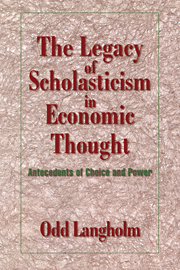Book contents
1 - The Aristotelian tradition
Published online by Cambridge University Press: 13 March 2010
Summary
Aristotle on compulsion and the voluntary
Aristotle's occupation with questions relating to the voluntary can be explained on the basis of the literary context of his ethical works, as well as on the basis of the broader cultural and historical circumstances. As a disciple of Plato, Aristotle was one of the first to try to make sense of what came to be known as the moral paradox of Socrates, namely, that no person acts against his own better judgment. He was perhaps the first to declare that this proposition “plainly contradicts the observed facts.” That remark occurs in the seventh book of the Nicomachean Ethics, in the course of Aristotle's discussion of άχρασία, usually rendered by English translators as “incontinence” (following the Latin tradition), but occasionally as “weakness of will.” These chapters in Book VII contain Aristotle's most penetrating analysis of the nature of the voluntary and the involuntary, but already in Book III there is a preliminary discussion of certain aspects of this question. It is presented by way of a general introduction to the analysis of the virtues and the vices. A person can be praised or blamed only for actions that he performs voluntarily. This is not merely a question of judgment and strength of will, but also of circumstances.
It is disputable whether Aristotle in some contexts should be interpreted as being a psychological determinist. He is perhaps best understood in the present context as though he was not, but the issue is not decisive for our purpose.
- Type
- Chapter
- Information
- The Legacy of Scholasticism in Economic ThoughtAntecedents of Choice and Power, pp. 15 - 29Publisher: Cambridge University PressPrint publication year: 1998

